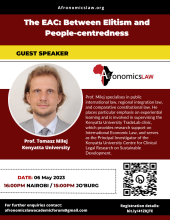Gender Mainstreaming in African Regional Trade Agreements
Gender equality is the cornerstone of sustainable development. It is an important aspect of all social and economic undertakings at a personal, national, and international level. Sustainable development can only be achieved if the unique needs of men and women are addressed systematically. Trade is essential in the development of families, communities, and countries. However, we cannot view development only as an increase in gross domestic product (GDP); it is also measured as an increase in human well-being. This means that trade at all levels affects, and is affected by, human well-being.
One of the debates around gender mainstreaming and trade has been whether international trade law can accommodate gender empowerment. Amrita Bahri in her work Women at the Frontline of COVID-19: Can Gender Mainstreaming in Free Trade Agreements Help? notes that FTAs can play an important role in reducing gender inequality; through them, countries can encourage their trade partners to create laws and procedures that can eliminate or reduce the barriers that impede women’s participation in trade.
Men and women experience trade differently, mostly due to gender roles determining how both genders access resources, use their time and earn income. Trade liberalization, despite its best intentions, has often perpetuated gender inequalities, with women being on the losing end.
